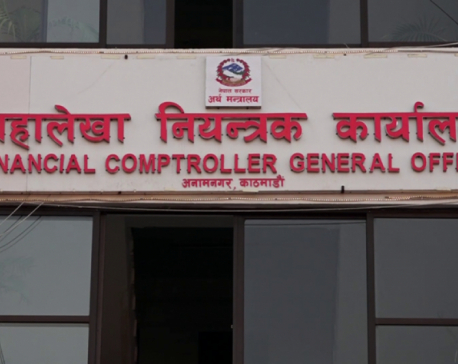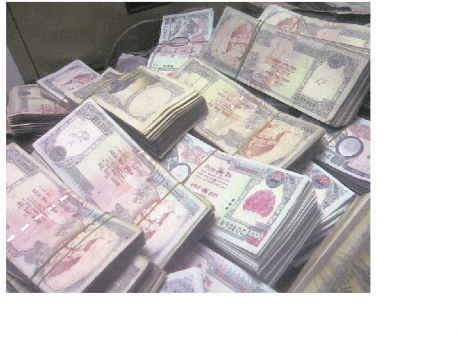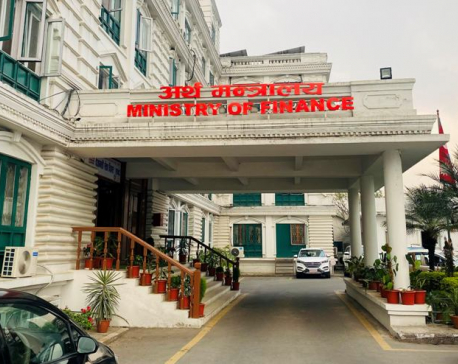
OR
Editorial
Fixing Nepal’s low and slow development spending
Published On: January 5, 2023 07:42 AM NPT By: Republica | @RepublicaNepal

Capital expenditure refers to the financial resources spent on infrastructure development of the country. The government’s capital budget includes funds allocated for the purpose of executing civil works and purchasing land, buildings, furniture, vehicles, plants, and machinery. Expediting the capital expenditure only in the last month of almost every fiscal year (FY) has been a chronic problem inherent in the government mechanism in Nepal. In the first five months of the current FY, the capital expenditure stands at just Rs 33.9 billion, which is less than one-tenth of the budget of Rs 380 billion allocated for capital expenditure in the current fiscal year. While the pace of capital expenditure in the first half of the FY almost always remains relatively sluggish, the capital expenditure surprisingly speeds up in the final few months of the fiscal year, more so in the last month. For instance, the government paid out an exorbitant Rs 14.72 billion in a single day on July 9, setting a record for the highest one-day capital expenditure in the last fiscal year. With this, the capital expenditure soared from 50.2 percent to 64.69 percent within a week. There has been a common practice among bureaucrats to transfer budget in the last hour as a face-saving measure. Delays in awarding contracts as well as massive corruption at the bureaucratic level are largely to be blamed for this type of hasty spending of the budget in the final moments. All these ultimately result in poor quality of work in infrastructure development.
Low capital expenditure has been a perennial problem of Nepal, no matter which political party is leading the government. It was only in the FY 2012/13 when the capital spending reached 82.56 percent, a record high spending. Being an underdeveloped country, Nepal calls for a reasonable size of capital expenses in the government budget, but the government hardly allocates up to 25 percent under the heading. Worse still, the major portion of the budget allocated for capital expenditure remains unused. Inadequate capital expenditure certainly means inadequate production of real capital goods as it slows the development activities. But the impact of the unspent capital budget goes far beyond. The slow economic activities also take down job opportunities and reduce the cash flow of banks, which ultimately affects the interest rate in the country’s monetary system. Higher interest rates as an outcome of inadequate cash flow hits the private sector’s investment. It also creates a binding constraint to economic growth, delaying the improvement of the people's living standards. Although the private sector has been making good progress in the country’s economic development, the government investment still plays the leading role in construction of the infrastructures and public utility. Overall, low capital expenditure affects the entire financial cycle.
In view of the low capital expenditure in the past, a provision has been made through the constitution to allow the government to announce the budget statement one and a half months prior to the start of the new fiscal year. Yet, the government has routinely been falling short of the target. This reveals a weaker efficiency of government officials in both the preparation and implementation sides of the development projects. Poor preparation in terms of project design, lengthy process in awarding contracts and the negligence on the part of contractors after bagging the contracts are also equally important factors behind the low and slow capital expenditure. In the words of economists, chronically low capital spending is also the result of structural weaknesses in project preparation and implementation, low project readiness, bureaucratic hassles in approving and re-approving projects, poor project management and contractors’ capacity and high fiduciary risk in project implementation at sub-national level and political intervention both at planning and operational levels. It is good to note that Prime Minister Pushpa Kamal Dahal has expressed concern over the ‘pathetic’ capital expenditure and asked the bodies concerned to find out the real causes behind this. But one-time instruction might not be sufficient for this. There is a need to overhaul almost every step including project selection, procurement process and project design and the implementation of the projects. A rigorous follow up from the higher level and effective coordination among line ministries with the Ministry of Finance and National Planning Commission are equally important to expedite capital spending.
You May Like This

Govt capital expenditure falls short with only 40% of the allocated budget utilized in the first 11 months of the current FY
KATHMANDU, June 18: The government spent only 40.24 percent of the budget allocated for capital expenditure in the first 11... Read More...

A Disappointing Picture of Capital Expenditure
Expenditure made by the government on infrastructure and development projects is referred to as public capital expenditure. This spending is... Read More...

Govt carried out budget transfer of Rs 41.39 billion in FY 2022/23
KATHMANDU, Aug 6: The government carried out a cash transfer of Rs 41.39 billion from unused funds meant for capital... Read More...






Just In
- Challenges Confronting the New Coalition
- NRB introduces cautiously flexible measures to address ongoing slowdown in various economic sectors
- Forced Covid-19 cremations: is it too late for redemption?
- NRB to provide collateral-free loans to foreign employment seekers
- NEB to publish Grade 12 results next week
- Body handover begins; Relatives remain dissatisfied with insurance, compensation amount
- NC defers its plan to join Koshi govt
- NRB to review microfinance loan interest rate











Leave A Comment